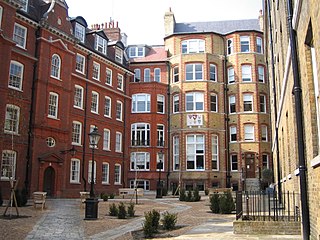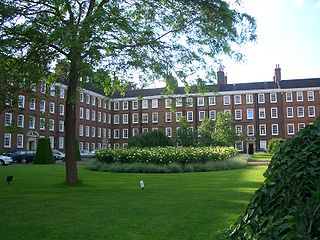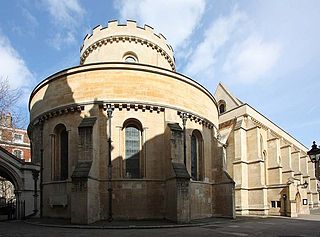
A barrister is a type of lawyer in common law jurisdictions. Barristers mostly specialise in courtroom advocacy and litigation. Their tasks include taking cases in superior courts and tribunals, drafting legal pleadings, researching the law and giving expert legal opinions.

The Honourable Society of the Middle Temple, commonly known simply as Middle Temple, is one of the four Inns of Court exclusively entitled to call their members to the English Bar as barristers, the others being the Inner Temple, Gray's Inn and Lincoln's Inn. It is located in the wider Temple area of London, near the Royal Courts of Justice, and within the City of London. As a liberty, it functions largely as an independent local government authority.

The Honourable Society of the Inner Temple, commonly known as the Inner Temple, is one of the four Inns of Court and is a professional association for barristers and judges. To be called to the Bar and practise as a barrister in England and Wales, a person must belong to one of these Inns. It is located in the wider Temple area, near the Royal Courts of Justice, and within the City of London. As a liberty, it functions largely as an independent local government authority.

The Honourable Society of Gray's Inn, commonly known as Gray's Inn, is one of the four Inns of Court in London. To be called to the bar in order to practise as a barrister in England and Wales, an individual must belong to one of these inns. Located at the intersection of High Holborn and Gray's Inn Road in Central London, the Inn is a professional body and provides office and some residential accommodation for barristers. It is ruled by a governing council called "Pension", made up of the Masters of the Bench and led by the Treasurer, who is elected to serve a one-year term. The Inn is known for its gardens which have existed since at least 1597.
The call to the bar is a legal term of art in most common law jurisdictions where persons must be qualified to be allowed to argue in court on behalf of another party and are then said to have been "called to the bar" or to have received "call to the bar". "The bar" is now used as a collective noun for barristers, but literally referred to the wooden barrier in old courtrooms, which separated the often crowded public area at the rear from the space near the judges reserved for those having business with the court. Barristers would sit or stand immediately behind it, facing the judge, and could use it as a table for their briefs.

The Inns of Court in London are the professional associations for barristers in England and Wales. There are four Inns of Court – Gray's Inn, Lincoln's Inn, Inner Temple and Middle Temple.

The Temple Church is a royal peculiar church in the City of London located between Fleet Street and the River Thames, built by the Knights Templar as their English headquarters. It was consecrated on 10 February 1185 by Patriarch Heraclius of Jerusalem. During the reign of King John (1199–1216) it served as the royal treasury, supported by the role of the Knights Templar as proto-international bankers. It is now jointly owned by the Inner Temple and Middle Temple Inns of Court, bases of the English legal profession. It is famous for being a round church, a common design feature for Knights Templar churches, and for its 13th- and 14th-century stone effigies. It was heavily damaged by German bombing during World War II and has since been greatly restored and rebuilt.

The Temple is an area of London surrounding Temple Church. It is one of the main legal districts in London and a notable centre for English law, historically and in the present day. It consists of the Inner Temple and the Middle Temple, which are two of the four Inns of Court and act as local authorities in place of the City of London Corporation as to almost all structures and functions.

The Inns of Chancery or Hospida Cancellarie were a group of buildings and legal institutions in London initially attached to the Inns of Court and used as offices for the clerks of chancery, from which they drew their name. Existing from at least 1344, the Inns gradually changed their purpose, and became both the offices and accommodation for solicitors and a place of initial training for barristers.

Barristers in England and Wales are one of the two main categories of lawyers in England and Wales, the other being solicitors. Barristers have traditionally had the role of handling cases for representation in court, both defence and prosecution.

A bencher or Master of the Bench is a senior member of an Inn of Court in England and Wales or the Inns of Court in Northern Ireland, or the Honorable Society of King's Inns in Ireland. Benchers hold office for life once elected. A bencher can be elected while still a barrister, in recognition of the contribution that the barrister has made to the life of the Inn or to the law. Others become benchers as a matter of course when appointed as a High Court judge. The Inn may elect non-members as honorary benchers – for example, distinguished judges and lawyers from other countries, eminent non-lawyers or members of the British Royal Family, who become known as "Royal Benchers" once elected.

Serjeant's Inn was the legal inn of the Serjeants-at-Law in London. Originally there were two separate societies of Serjeants-at-law: the Fleet Street inn dated from 1443 and the Chancery Lane inn dated from 1416. In 1730, the Fleet Street lease was not renewed and the two societies merged. The society's relevance diminished as Serjeants-at-Law were gradually superseded by Queen's Counsel in the nineteenth century. The building in Chancery Lane was sold in 1877 and the assets were distributed amongst the surviving members, although the society was not formally dissolved. The last member, Lord Lindley, died in 1921. The Fleet Street building was destroyed in the 1941 bombing raids during World War II.

The City Law School is one of the five schools of City, University of London. In 2001, the Inns of Court School of Law became part of City, and is now known as the City Law School. Until 1997, the ICSL had a monopoly on the provision of the Bar Vocational Course, the obligatory professional training for would-be barristers in England and Wales, before they commence pupillage.

The Bar of Northern Ireland is the professional association of barristers for Northern Ireland, with over 600 members. It is based in the Bar Library, beside the Royal Courts of Justice in Belfast, together with the Bar Council of Northern Ireland and the Executive Council. The Executive Council has taken on many of the functions formerly exercised by the Benchers of the Inn of Court of Northern Ireland, which was established at a meeting of the Bench and Bar held on 11 January 1926.

The Bar of Ireland is the professional association of barristers for Ireland, with over 2,000 members. It is based in the Law Library, with premises in Dublin and Cork. It is governed by the General Council of the Bar of Ireland, which was established in 1897. The Council is composed of twenty-five members: twenty who are elected, four co-opted, and the Attorney-General, who holds office ex officio. Every year, ten members are elected for two-year terms; five by senior counsel and five by junior counsel.

The Outer Temple is a building next to the Temple in London, just outside the City of London. In the 14th century, the property seized from the Knights Templar was divided, and that part of the Temple property then just outside London was given the name Outer Temple. It has been suggested that the name Outer Temple once also referred to an Inn of Chancery; its historical existence was first posited by A. W. B. Simpson and confirmed by John Baker in 2008. Little is known of it, other than that it lacked a hall; Baker suggests that this is the reason that it did not survive long enough to appear in many records. Other writers have insisted that it was never an inn: Sir George Buck wrote in 1612 "the Utter Temple neither is nor was ever any college or society of students".
The Legal profession in England and Wales is divided into two distinct branches under the legal system, those of solicitors and barristers. Other legal professions in England and Wales include acting as a judge, as the Attorney-General, as the Solicitor-General, or as the Director of Public Prosecutions.

King's Bench Walk is a street in Temple, in the City of London. It is mainly made up of barristers' chambers.
The Royal Commission on the Inns of Court carried out an investigation into the Inns of Court and associated Inns of Chancery between 1854 and 1855. The inns were medieval guild-like institutions that provided accommodation for lawyers and had developed gradually into centres for legal education. All barristers in the country had to be a member of one of the inns. It included many of the leading lawyers and jurists of the time. The commission found many of the inns, particularly the Inns of Chancery, were ineffective at educating students and recommended the creation of a single university of law. Steps were taken to accomplish this and a parliamentary bill was prepared but it was never achieved. The commission did, however, have an influence on legal education for decades and was a factor in the establishment of modern law schools at the universities of Cambridge, Oxford and London.
The New Inn was one of the Inns of Chancery or Hospida Cancellarie. It existed from the late 15th century until 1902 and was located near Aldwych in London.














